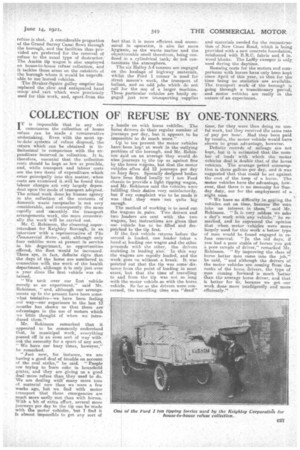COLLECTION OF REFUSE BY ONE-TONNERS.
Page 27

If you've noticed an error in this article please click here to report it so we can fix it.
Iis impossible that in any circumstances the collection of house refuse can be made a remunerative undertaking. Even with the most upto-date systems of refuse disposal, the return which can be obtained is infinitesimal in comparison with the ex, penditure incurred in collection. It is, therefore, essential that the collection costs should be kept as low as possible, and, while transport and labour costs are the two items of expenditure which enter principally into this matter, when costs are examined it will be found that labour charges are very largely dependent upon the mode of transport adopted. The actual work done by human agency in the collection of the contents of domestic waste receptacles is not very considerable, and consequently the more rapidly and smoothly the transport arrangements work, the more economically the work will be carried out.
Mr. C. Robinson the cleansing superintendent for Reighley Borough, in an interview with a representative of The llommercial Motor, said, although only four v.ehieles were at presentin service in his degartments as opportunities offered, the fleet would be increased. There are, in fact, definite signs that the days of the horse are numbered in connection wirli the work of the health department, although it is only just over a year since ifie first vehicle was obtained.
"We took over our first vehicle merely as an experiment," said Mr. Robinson, " and, although our arrangements up fo the present have been somewhat tentative-ewe have been feeling our way—our experience in the last 12 months has shown us that there are advantages in the use of meters which we little thought of when we introduced them."
Mr. Robinson remarked that it appeared to be commonly understood that, in municipal work, everything passed off in an even scat of way without the necessity for a spurt of any sort. " We have Our busy times, however," he remarked.
"Just now, for instance, we are having a good deal of trouble an account of the coal strike," he said. "People are trying to burn coke in household grate.s, and they are giving us a good dealmore refuse than they used to do. We are dealing with many more tons of material new than we were a few weeks ago, but we find with motor transport that these emergencies are much more easily met than with horses. With a hit of extra effort, several more journeys per day to the tip can be made with the motor vehicles, but I find it is almost impossible to get any sort of a hustle an with horse vehicles. The horse drivers do their regular number of Journeys per day, but, it, appears to be impossible to do much more."
UP to the present the motor vehicles have been kept at work in the outlying portions of the borough, and Mr. Robinson said on an average they would do nine journeys to the tip as against five by the horse wagons, but that the motor vehicles often fflcl 12 journeys per day on busy aays. Specially designed lacidies have been fitted locally to 1 ton Ford chassis to provide a light tipping wagon, and Mr. Robinson said the vehicles were fulfilling their duties very satisfactorily. but if any complaint was to be made it was that they were .:net quite big enough.
The method of working, is to send out the wagons in pairs. Two drivers and two loaders are seat with the two wagons, but instructions are given that, one vehicle has to be filled and des patched to the tip first. "
If the first vehicle returns before the second is loaded, one loader takes a. hand at loading one wagon and the other proceeds with the other, the drivers assisting in loading also: In this way the wagons are rapidly loaded, and the work goes on without a break. It was pointed out that the tip was some distance from the point of loading in most eases, but that the time of travelling to and from the tip was not RP long with the motor vehicle as with the horse vehicle. So far as the drivers were concerned, the -travelling time was "dead" time, for they were then doing no useful work, but they received the same rate of pay per hour. lied they been paid by results, the motor vehicle would have shown to great advantage, however. Definite records of mileage are not kept, bee it is estimated that the number of loads with whichthe motor vehicles deal is double that of the horse vehicles. The average petrol -consumption is three gallons per -day, and it was suggested' thatthat could be set against the cost of the keep of a horse. The -motor vehicles have the advantage, however, that there is no necessity for Sunday duty, nor for the employment of a. night man. " We have no difficulty in geSting.the vehicles out on -time, because 'die men take an interest in them." said Mr. Robinson. " It is very seldom we miss a daY's work with any vehicle," he remarked, and he expressed the opinion that when motor -veltieles were more largely used for thiswork a better type of man would be found engaged in refuse removal. "In the old days; if you had a poor stable of horses you got a poor sample of driver," remarked Mr. Robinson. "By improving the class of horse better m.en came into the job," he said, "and although the drivers of the motor vehicles are coming from the ranks of the horse arivers, the type of 'man cbming -forward is much better flan the average horse driver, and that is better for its, because we get our work dime more intelligently and more efficiently."






































